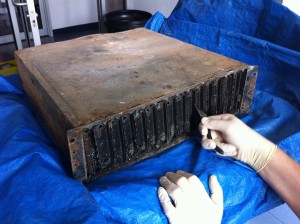
Our engineer removing a hard drive from a fire-damaged RAID.
Datarecovery.com is a leader in professional data solutions, and with risk-free media evaluations and our no data, no charge guarantee, we provide fast answers while minimizing risk. To get your case started, our engineers need a few key pieces of information about your device, the data you need, and the circumstances of the failure.
If you’re ready to get started, submit your information online or call us at 1-800-237-4200 to speak with an expert.
Data Recovery Services: Providing Key Info for Better Results
The information you provide helps our engineers prepare to receive your media and evaluate it quickly. The more info we have to work with, the better.
We primarily need to know about the failure scenario, the specific files you need, and your required turnaround time.
1. The Data Loss Scenario
The failure scenario describes the events that led to the data loss and the symptoms the device is showing. To give our engineers a clear picture, try to include details like:
- Events Leading to Failure: What happened right before you lost access to your data? Was the device dropped? Was there a power surge? Did you accidentally delete files or reformat a drive?
- Device Symptoms: What is the device doing now? Is it making unusual noises (clicking, grinding, beeping)? Does it fail to appear in your operating system? Is it running extremely slowly? Are you seeing specific error messages?
- Recovery Attempts: Have you tried to recover the data yourself? Did you run any data recovery software, or take the device to an IT service for diagnosis?
That last point is especially important. It’s okay if you tried to recover your data — nearly every client attempts something. Just don’t hide that info: Our engineers need to know what was attempted in order to minimize the risk of permanent data loss.
2. Storage Device Specifics
If possible, please collect the following information:
- Device Type: Is it a traditional hard disk drive (HDD), a solid-state drive (SSD), a RAID array, a flash drive, a memory card, a phone, or something else? Our laboratories are equipped to handle any type of digital storage device, including legacy media like data tapes.
- Manufacturer and Model: For example, “Seagate Barracuda ST2000DM008” or “Samsung 980 Pro.” This is usually printed on a label on the device itself. If you’re not comfortable removing the drive from your computer, don’t worry about it.
- Capacity: Note that the device’s capacity doesn’t directly influence data recovery costs.
- Operating System and File System: What operating system was the device used with (e.g., Windows 11, macOS Sonoma)? If you know the file system (e.g., NTFS, APFS, exFAT), that information is also helpful (and if you’re not sure, that’s fine, too).
3. Critical Files
If we can’t recover the data you need, you don’t pay for the recovery attempt. To honor our guarantee, we need you to identify the files that are critical to the success of the recovery.
This list should include the file names, file types, or folder locations of your most important data. The more specific you can be, the better. For instance, instead of just saying “my documents,” you might specify, “The QuickBooks company file named ‘business_2024.qbw’ and the ‘Client Contracts’ folder from my desktop.”
Note: Our goal is always to provide a complete copy of your data. Identifying certain files as “important” will not change this — we’ll try to return everything unless you specify otherwise .
Professional Solutions for Data Recovery
Please provide as much information as you can, but don’t worry if you don’t know all the technical details. The most important step is to contact a professional data recovery provider as soon as possible following a failure.
At Datarecovery.com, every case begins with a risk-free evaluation, and every recovery attempt is backed by our no data, no charge guarantee. If you’ve experienced data loss, we’re here to help. Contact our experts at 1-800-237-4200 or submit a case online to get started.




